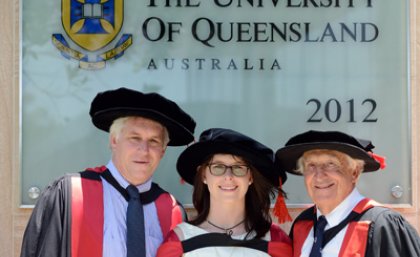
Graduating with a PhD from The University of Queensland has become a family tradition for Ilan Gobius, her father and grandfather.
All three have achieved PhDs from UQ, respectively in 2012, 1989 and 1973.
Ilan, from West End, said following in the footsteps of two important people in her life, made her PhD success at one of the world’s top 100 higher education and research institutes, all the more special.
Ilan’s maternal grandfather, Peter Mears, gained his PhD studying grazing cattle on kikuyu grass from UQ, about four decades ago in 1973.
Then in 1989, Ilan’s father Kari Gobius also crossed the graduation ceremony stage at UQ’s St Lucia campus to receive his PhD in microbiology.
It comes as no surprise that Monday, 17 December 2012, became a special day of celebration for the trio when Ilan became the third generation in the family to graduate with a PhD from UQ.
Ilan’s discipline is neuroscience.
“As a little girl I remember my grandfather taking me out in the fields on his property and we would name all the types of grasses we could see,” Ilan said.
“I also remember spending time as a child in my father’s lab when he was doing his PhD at UQ.”
For three-and-a-half years, Ilan, 27, has studied brain disorders after receiving a total of $27,500 in scholarship money from UQ’s Research Office and UQ’s Queensland Brain Institute.
“Both my grandfather and father have encouraged me to be interested in questions,” Ilan said.
“I’m fascinated about how the brain works – so I have studied how the left and right sides of the brain become wired together during development.
“My research aimed to help us better understand the brain disorders that occur when children are born without a connection between the left and right sides of the brain.
Ilan said although enjoyable, PhD study was challenging and family support and encouragement were crucial in helping her cross the finish line.
“It takes a long time to do a PhD,” she said.
“My father and grandfather would be on the phone telling me I could do it.”
Her father Kari, who is Theme Leader for Food Safety and Stability at CSIRO Animal, Food and Health Sciences, said he was excited that his daughter had also chosen to undertake her PhD.
“A PhD opens an incredible number of doors; you gain a strong sense of fulfillment, a love and commitment to lifelong learning and the confidence to take risks,” Kari said.
Ilan’s grandfather Peter, 78, said he too was proud to see the family tradition continue.
“It was also lovely to see the number of PhD graduates, there were nearly 50 PhDs - when I graduated in the 1970s there were about six of us,” Peter said.
This year, UQ celebrates its 10,000th PhD conferral. View this story here.
This graduating cohort joined a group of more than 200,000 distinguished UQ alumni, many of whom are pursuing careers around the world while choosing to stay connected with UQ.
Five honorary doctorates were also awarded including Emeritus Professor Robert Milns AM, Dr Jean Calder AC, Professor Dennis Liotta, Mr Andrew Petrie and Dr Samuel Hawgood.
The University of Queensland is one of Australia's leading teaching and research institutions and continues to attract the vast majority of the state's highest academic achievers.
Media contact: Belinda Berry, 3365 3439, b.berry2@uq.edu.au
.jpg)



